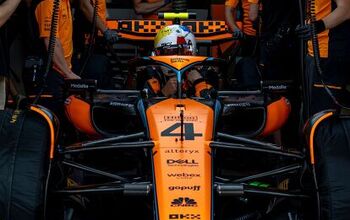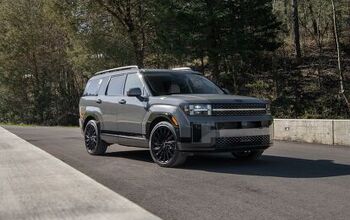Report: Porsche Killing Combustion Models Sooner Than Anticipated

With loads of automakers walking back past promises of electrification, Porsche seems committed to staying the course. Reports out of Germany are claiming that the brand has been forced to discontinue several combustion models for being out of regulatory compliance and now plans on accelerating its timeline to field more electric vehicles globally, rather than allowing the EU-banned combustion models to linger on markets less prone toward regulation.
Porsche executive board member Albrecht Reimold has confirmed with Germany’s Automobilwoche that the combustion version of the Macan SUV would not be produced beyond 2026. The 718 Boxster and Cayman were likewise said to leave the global market in 2025. They’ll both be replaced by electric alternatives and are assumed to see a price bump.
The 718 has already been discontinued in Europe after it failed to adhere to “cybersecurity regulations” stipulated by the European Union’s WP.29 UNECE World Forum for Harmonization of Vehicle Regulations. It was missing the now-mandatory array of “Advanced Driver Assistance Systems” and permanent connectivity to the internet mandated by the EU — including active driver monitoring.
It was a similar story for the Macan, leading to rampant speculation that Porsche would keep selling banned (but popular) models to markets located outside of Europe. While that did end up being the case, any hope of the brand extending the timeline as EV sales slow down appear to be dashed. Porsche seems committed toward pivoting toward all-electric vehicles and isn’t interested in having competing products targeting different markets.
While Porsche could have revamped those models to adhere to the present regulations without electrification, development cycles are pretty long and prohibitively expensive. It’s difficult and costly to change course midstream. Emissions requirements are also becoming so stringent that it’s bordering on impossible to meet them with combustion models and many European countries actually have dates that will ban gas or diesel-powered automobiles.
However, Reimold seemed to see the brand’s electrification agenda as more than just adhering to government requirements. He called it a “form of wellness” and claimed it was basically inevitable as the industry desires to see more digital cars. While this can be done with combustion models, it’s supposedly easier with all-electric platforms.
Reimold stated that, if anything, he expected Porsche to have placed even more EVs on the market than it already has. The issue allegedly cost Porsche some serious dough. But he noted that supply chains needed to be reevaluated and that the automotive sector lost a lot of solid employees after 2020.
There were reasons to assume the industry might pivot away from EVs, however. Sales have been slowing and there’s a meaningful portion of consumers that have no interest in purchasing them. American brands are having trouble moving them on the domestic market and Japanese brands appear to be leaning toward hybridization to meet regulations, while trying to offer pure combustion vehicles whenever possible.
Months of polling data likewise suggested that Western European countries were about to elect right-leaning leadership and, since electric vehicles have been stupidly been shoehorned into politics, it was assumed that this would result in nations walking back their electrification goals. Regulations penned in Brussels would have been snubbed or undone as the European Commission became more conservative.
However, French elections resulted in an alliance between the New Popular Front and President Macron’s Ensemble. With no single party achieving a majority, the left retained control of the country despite right-wing National Rally gaining a staggering amount of ground. The United Kingdom likewise just saw Conservatives lose to the hard-left Labour Party. Although, the latter might not have mattered due to the fact that the British Conservative Party would be considered left-leaning by American standards. One of the main reasons they lost has been attributed to the fact that voters hadn’t seen leadership making the kinds of changes they asked for.
With the above in mind, Porsche may be trying to stay ahead of the curve. Industry development cycles are long and expensive, discouraging automakers from making sweeping changes. That is, unless regulations stipulate those changes need to be made. At present, the EU wants the automotive sector to pivot toward electric vehicles. Without a surging opposition movement (again crazy that EVs have been made political) that’s likely to remain the case.
Porsche intends on building 80,000 electrified Macans per year, which will use batteries supplied by China’s CATL. When asked if that was still to be the case, Reimold was evasive about production volumes without being negative.
“I don't attribute success to a single number, even though the orders are fortunately already in the five-figure range,” he said in German before praising the “sustainability” of EVs.
But he likewise touted the success of the combustion Macan, noting that it was still a big seller for the brand. Based on what was said in the interview, we’d guess Porsche will try to build as many as it can before the model is put to bed. However, Reimold reiterated that “volume alone is not a benchmark for us as a luxury manufacturer.”
The 718 is supposed to see its global discontinuation in the middle of 2025, its all-electric replacement “predestined.” Interestingly, Porsche seems committed to trying to keep the 911 as a combustion model or hybrid for as long as possible. This leaves one to wonder if the electrification of the brand’s more affordable models simply a matter of compliance, especially considering how often Reimold dismissed the importance of sales volume.
[Images: Porsche]
Become a TTAC insider. Get the latest news, features, TTAC takes, and everything else that gets to the truth about cars first by subscribing to our newsletter.

Consumer advocate tracking industry trends and regulations. Before joining TTAC, Matt spent a decade working for marketing and research firms based in NYC. Clients included several of the world’s largest automakers, global tire brands, and aftermarket part suppliers. Dissatisfied, he pivoted to writing about cars. Since then, he has become an ardent supporter of the right-to-repair movement, been interviewed about the automotive sector by national broadcasts, participated in a few amateur rallying events, and driven more rental cars than anyone ever should. Handy with a wrench, Matt grew up surrounded by Detroit auto workers and learned to drive by twelve. A contrarian, Matt claims to prefer understeer and motorcycles.
More by Matt Posky
Latest Car Reviews
Read moreLatest Product Reviews
Read moreRecent Comments
- MaintenanceCosts It at least looks more like a Cadillac and less like a Traverse than the XT6. I'm a shopper in this segment and would give it a test drive, which I wouldn't bother with for the XT6.
- 1995 SC Early El Camino = coolLate El Camino = coolThis one = not cool
- AZFelix A calendar search shows Saturday May 14th could have recently been in 2005, 2011, 2016, and 2022. The phone number now shows for Coys Wheel in Kaysville, UT.
- ToolGuy Tim said climate change is real, so I don't think this will ever apply to me.
- Arthur Dailey Always liked these. One of Nissan's last 'extra base hit' vehicles? Can't remember ever seeing a shifter worn as much as the one on this vehicle.









































Comments
Join the conversation
We're under 2 months into PHEV ownership and while there's some GREAT upside - mileage exceeding 50mpg - the car's handling doesn't match the badge. Until battery weight can be addressed, sporty hybrids feel more like luxury cars than good handling sedans. There's no free lunch.
Ironically, in Russian, a piston is called porshen. I guess, no more porshen for Porsche. But I don't care if this nazi nameplate goes away altogether. In US we have Lincoln and I don't imagine that a brand would be named Davis. Although there was such car brand but it was different Davis. So, why one of the nazi party leaders would have his name on the modern car brand? Even NY Times agrees - They Are the Heirs of Nazi Fortunes, and They Aren’t Apologizing